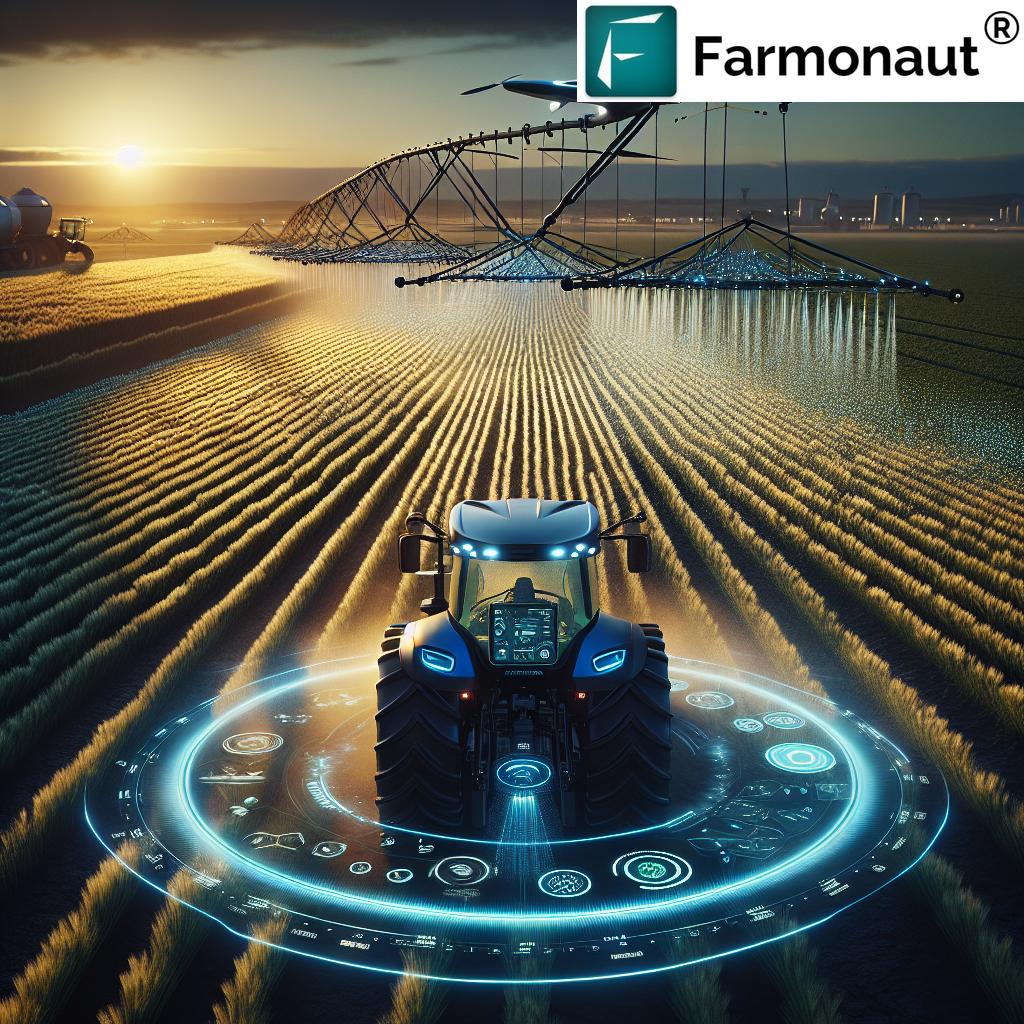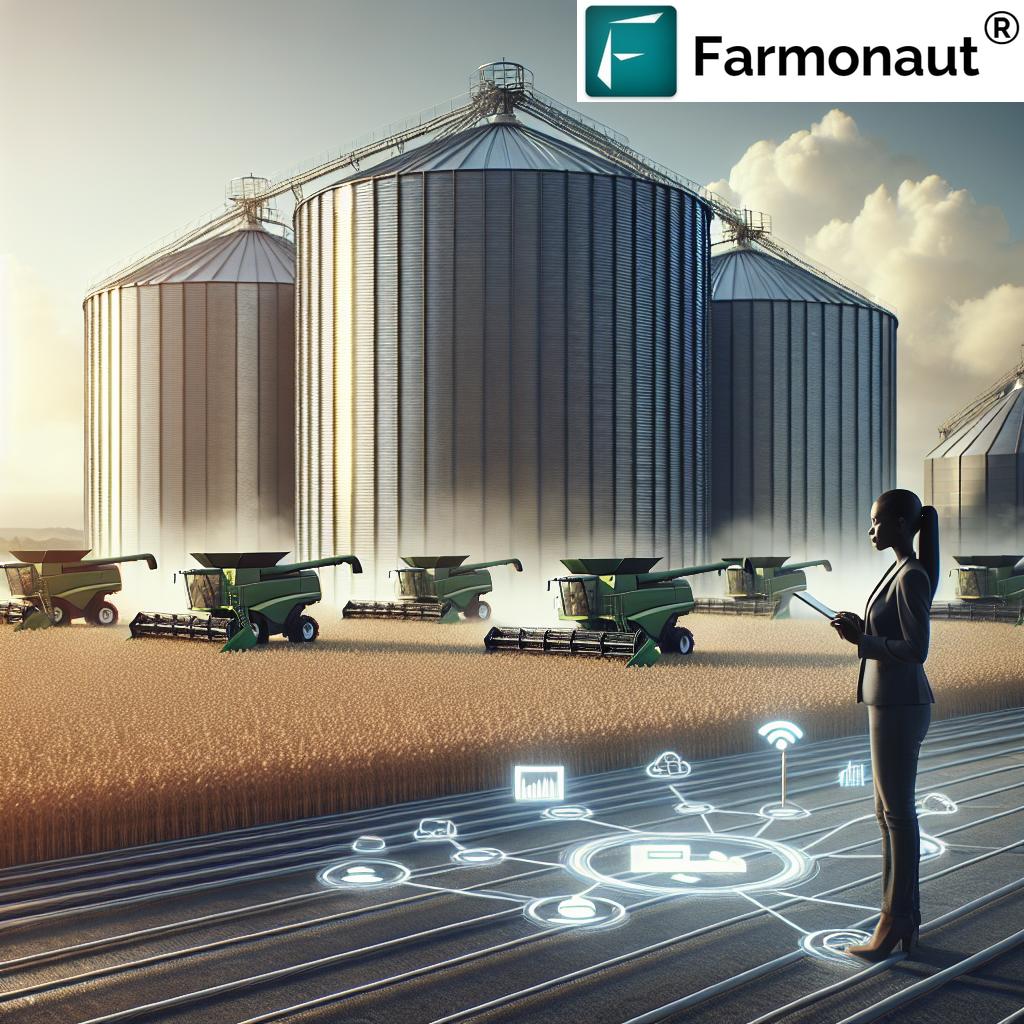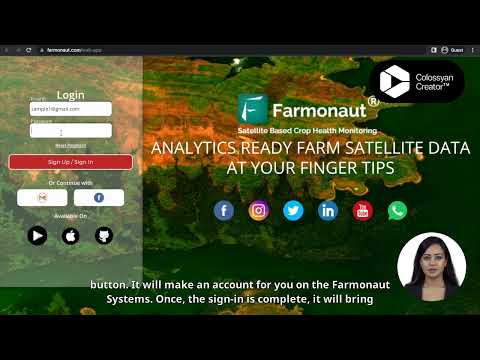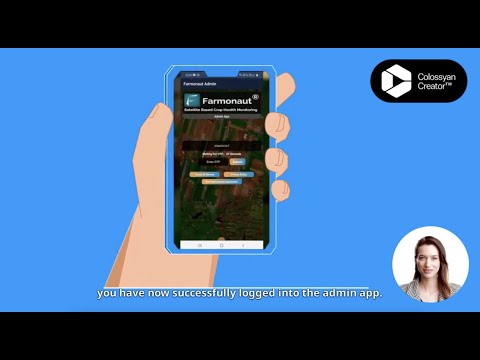Revolutionizing County Farming: How Precision Agriculture and GPS-Guided Tractors Boost Crop Yields
“GPS-guided tractors can improve farming efficiency by up to 30%, reducing fuel consumption and minimizing overlap in field operations.”
Welcome to the future of farming! At Farmonaut, we’re excited to explore how cutting-edge precision farming technology and smart farming techniques are transforming the agricultural landscape. In this comprehensive guide, we’ll delve into the revolutionary world of precision agriculture, focusing on how GPS-guided tractors and advanced farm equipment are boosting crop yields and reshaping farm management practices across counties.

The Rise of Precision Agriculture
Precision agriculture is revolutionizing the way we approach farming. By leveraging advanced technologies such as GPS, satellite imagery, and IoT sensors, farmers can now make data-driven decisions that optimize every aspect of their operations. This shift from traditional farming methods to precision agriculture is not just a trend; it’s a necessary evolution to meet the growing global demand for food while conserving resources and protecting the environment.
- Increased Efficiency: Precision farming allows for targeted application of inputs, reducing waste and increasing productivity.
- Resource Conservation: By optimizing water usage and minimizing chemical applications, precision agriculture promotes sustainable practices.
- Higher Yields: Data-driven decision-making leads to improved crop health and increased yields.
- Cost Reduction: Over time, precision agriculture can significantly reduce operational costs for farmers.
At Farmonaut, we’re at the forefront of this agricultural revolution, providing farmers with the tools they need to embrace precision farming techniques. Our satellite-based crop health monitoring system and AI-powered advisory services are helping farmers across counties make smarter decisions and achieve better results.
GPS-Guided Tractors: The Game-Changer in Field Operations
One of the most significant advancements in precision agriculture is the introduction of GPS-guided tractors. These high-tech machines are transforming field operations, offering unprecedented accuracy and efficiency. Let’s explore how GPS-guided tractors are revolutionizing county farming:
- Precise Navigation: GPS-guided tractors can navigate fields with centimeter-level accuracy, reducing overlap and skips in planting, spraying, and harvesting operations.
- Automated Steering: Operators can focus on monitoring equipment performance while the tractor steers itself, reducing fatigue and improving overall efficiency.
- Variable Rate Application: GPS technology enables tractors to apply seeds, fertilizers, and pesticides at variable rates across a field, optimizing input use based on soil conditions and crop needs.
- Fuel Efficiency: By minimizing overlap and optimizing field paths, GPS-guided tractors significantly reduce fuel consumption.
- 24/7 Operations: With precise guidance systems, tractors can operate effectively even in low-visibility conditions, extending working hours when necessary.
The integration of GPS technology in tractors is not just about convenience; it’s about revolutionizing the entire approach to field management. Farmers using GPS-guided tractors report significant improvements in productivity, with some seeing up to a 30% increase in efficiency.
Advanced Crop Irrigation Systems: Precision Water Management
Water is a precious resource in agriculture, and precision irrigation systems are playing a crucial role in optimizing its use. Advanced crop irrigation systems, when combined with GPS and sensor technologies, allow for precise water application based on real-time soil moisture data and crop needs.
- Soil Moisture Sensors: These devices provide real-time data on soil moisture levels, allowing for targeted irrigation.
- Weather Station Integration: Local weather data helps predict water needs and adjust irrigation schedules accordingly.
- Drip Irrigation: Precision systems can deliver water directly to plant roots, minimizing evaporation and runoff.
- Smart Sprinklers: GPS-guided sprinkler systems can adjust water application based on field maps and crop requirements.
By implementing these advanced irrigation techniques, farmers can reduce water usage by up to 25% while improving crop yields. This not only conserves water but also leads to significant cost savings and increased sustainability.
“Precision agriculture techniques can increase crop yields by 10-15% while reducing water usage by up to 25% through optimized irrigation systems.”
Innovative Grain Storage Solutions
Proper grain storage is crucial for maintaining crop quality and maximizing profits. Modern grain storage solutions are incorporating smart technologies to improve monitoring and management:
- Temperature and Moisture Sensors: Continuous monitoring ensures optimal storage conditions.
- Automated Aeration Systems: Maintain ideal humidity levels to prevent spoilage.
- Remote Monitoring: Farmers can check storage conditions via smartphone apps, allowing for quick responses to any issues.
- Inventory Management Software: Tracks grain quantities and qualities, facilitating better market timing decisions.
These innovative storage solutions not only protect the quality of harvested crops but also provide valuable data for farm management and marketing decisions.
Explore Farmonaut’s API for advanced data integration
Sustainable Agriculture Practices in the Digital Age
Sustainability is at the heart of modern agriculture, and precision farming technologies are key enablers of sustainable practices. Here’s how digital innovation is promoting sustainability in county farming:
- Reduced Chemical Use: Precision application of fertilizers and pesticides minimizes environmental impact.
- Soil Conservation: GPS-guided equipment reduces soil compaction and erosion.
- Energy Efficiency: Smart farm management reduces overall energy consumption.
- Biodiversity Protection: Targeted pest management helps preserve beneficial insects and wildlife.
- Carbon Footprint Reduction: Efficient operations and reduced input use lower overall carbon emissions.
At Farmonaut, we’re committed to promoting sustainable agriculture through our advanced satellite monitoring and AI advisory systems. Our platform helps farmers make environmentally conscious decisions while improving their bottom line.

The Evolution of Farm Equipment Dealers
As precision agriculture technologies become more prevalent, farm equipment dealers are adapting to meet the changing needs of modern farmers. Here’s how the landscape is evolving:
- Tech-Savvy Sales Teams: Dealers are training their staff to understand and explain complex precision farming technologies.
- Expanded Service Offerings: Many dealers now provide software updates, sensor calibrations, and data management services.
- Demo Programs: Offering trial periods for high-tech equipment allows farmers to experience the benefits firsthand.
- Financing Options: Flexible payment plans help farmers invest in advanced machinery without straining their budgets.
- Training and Support: Dealers are becoming educational hubs, offering workshops and ongoing support for precision farming technologies.
This evolution in the role of farm equipment dealers is crucial in bridging the gap between traditional farming practices and the adoption of precision agriculture technologies.
Agricultural Drone Technology: A Bird’s-Eye View of Crop Health
Drones are becoming an indispensable tool in modern agriculture, offering farmers a unique perspective on their crops. Here’s how agricultural drone technology is transforming crop monitoring and management:
- Aerial Mapping: Drones can quickly create detailed maps of large areas, helping in field planning and crop assessment.
- Multispectral Imaging: Specialized cameras can detect crop stress before it’s visible to the naked eye.
- Precision Spraying: Some drones can apply pesticides or fertilizers with pinpoint accuracy, reducing chemical use.
- Plant Counting: AI-powered image analysis can provide accurate plant population counts.
- Livestock Monitoring: Drones help in tracking and managing livestock over large pastures.
The integration of drone technology with farm management software creates a powerful tool for data-driven decision-making. At Farmonaut, we complement drone-based insights with our satellite imagery analysis, providing farmers with comprehensive crop health information.
Check out our API Developer Docs for integrating drone data
Farm Management Software: The Digital Brain of Modern Agriculture
Farm management software is the cornerstone of precision agriculture, integrating data from various sources to provide actionable insights. Here’s how it’s revolutionizing farm operations:
- Centralized Data Management: All farm data, from crop yields to equipment maintenance, is stored and accessed in one place.
- Real-Time Monitoring: Farmers can track field conditions, equipment location, and crop health in real-time.
- Predictive Analytics: AI-powered software can forecast potential issues and suggest preventive measures.
- Financial Planning: Integrated financial tools help in budgeting, forecasting, and profit analysis.
- Compliance Management: Automated record-keeping ensures compliance with agricultural regulations.
Farmonaut’s farm management platform offers these features and more, helping farmers streamline their operations and make data-driven decisions for optimal results.
Optimizing Operations Across Various Agricultural Sectors
Precision farming technologies are not limited to traditional crop farming. They’re making significant impacts across various agricultural sectors:
Grassland Management
GPS-guided equipment helps in precise seeding and fertilizer application in pastures, while drones assist in assessing grass quality and identifying problem areas.
Vineyard Operations
Precision viticulture uses sensors to monitor grape quality, soil moisture, and microclimates, ensuring optimal growing conditions for high-quality wine production.
Potato Farming
GPS-guided planters and harvesters improve planting accuracy and reduce tuber damage during harvest. Soil sensors help in managing irrigation and preventing common potato diseases.
Livestock Farming
RFID tags and GPS collars track animal health and movement, while automated feeding systems ensure precise nutrition management.
The Evolution of Agricultural Machinery
The integration of precision technologies is driving significant changes in agricultural machinery. Let’s look at how some key equipment types are evolving:
Combines
Modern combines feature real-time yield mapping, automated adjustments for different crop conditions, and integration with farm management software for immediate data analysis.
Balers
Precision balers now offer moisture sensors, weight monitoring, and GPS tracking to ensure consistent bale quality and optimize field logistics.
Sprayers
Advanced sprayers use GPS and individual nozzle control to apply chemicals with pinpoint accuracy, reducing waste and environmental impact.
Comparing Traditional and Precision Farming Techniques
| Farming Aspect | Traditional Method | Precision Farming Method |
|---|---|---|
| Crop Monitoring | Visual inspection, periodic soil testing | Real-time satellite and drone imagery, continuous soil sensors |
| Irrigation | Scheduled watering, uniform application | Variable rate irrigation based on soil moisture sensors and weather data |
| Fertilizer Application | Uniform application across fields | Variable rate application based on soil nutrient maps and crop needs |
| Pest Management | Blanket spraying of pesticides | Targeted application using drone imagery and GPS-guided sprayers |
| Harvesting | Manual timing, uniform approach | Automated timing based on crop maturity data, variable speed harvesting |
| Data Collection | Manual record-keeping, end-of-season analysis | Real-time data collection and analysis through IoT sensors and farm management software |
| Equipment Used | Standard tractors and implements | GPS-guided machinery, drones, IoT-enabled equipment |
| Yield Prediction | Based on historical data and experience | AI-powered predictions using multi-source data (weather, soil, satellite imagery) |
| Resource Efficiency | Low to moderate | High (up to 30% improvement in input use efficiency) |
| Environmental Impact | Higher potential for overuse of resources | Reduced environmental footprint through optimized resource use |
The Future of Farming: Integrating Traditional Knowledge with Digital Innovation
As we embrace precision agriculture and smart farming techniques, it’s crucial to remember that these technologies are tools to enhance, not replace, the wisdom of experienced farmers. The future of farming lies in the seamless integration of traditional agricultural knowledge with cutting-edge digital innovations.
- Hybrid Approaches: Combining time-tested farming practices with data-driven insights for optimal results.
- Continuous Learning: Encouraging farmers to adapt and learn new technologies while valuing their experience.
- Community Collaboration: Sharing knowledge and data among farming communities to collectively improve practices.
- Sustainable Innovation: Developing technologies that not only increase productivity but also promote environmental stewardship.
At Farmonaut, we’re committed to bridging this gap between tradition and innovation, providing tools that empower farmers to make the best decisions for their unique situations.
Conclusion: Embracing the Agricultural Revolution
The revolution in county farming through precision agriculture and GPS-guided tractors is not just about adopting new technologies; it’s about reimagining the entire approach to agriculture. From increased crop yields to sustainable resource management, the benefits of these innovations are transforming the agricultural landscape.
As we look to the future, it’s clear that the integration of precision farming technologies will continue to play a crucial role in meeting global food demands while preserving our natural resources. At Farmonaut, we’re proud to be at the forefront of this agricultural revolution, providing farmers with the tools and insights they need to thrive in this new era of farming.
We invite you to join us on this exciting journey. Whether you’re managing grasslands, vineyards, or potato fields, our precision farming solutions can help you optimize your operations and boost your crop yields. Explore our satellite-based monitoring services, AI-powered advisory systems, and comprehensive farm management tools to take your farming practices to the next level.
FAQs
- Q: How does GPS guidance improve tractor efficiency?
A: GPS guidance systems allow tractors to navigate fields with centimeter-level accuracy, reducing overlap and skips in operations like planting and spraying. This precision can improve efficiency by up to 30%, saving fuel and time. - Q: Can precision agriculture techniques be applied to small farms?
A: Absolutely! Many precision agriculture tools, like Farmonaut’s satellite monitoring services, are scalable and can benefit farms of all sizes. Even small improvements in efficiency can make a significant difference for small farmers. - Q: How does farm management software integrate with other precision farming tools?
A: Farm management software acts as a central hub, collecting and analyzing data from various sources such as GPS-guided equipment, soil sensors, and weather stations. It then provides actionable insights to help farmers make informed decisions. - Q: What are the initial costs associated with implementing precision farming technologies?
A: Initial costs can vary widely depending on the technologies adopted. However, many solutions, like Farmonaut’s platform, offer affordable subscription models that allow farmers to start with basic services and scale up as needed. - Q: How does precision agriculture contribute to sustainable farming practices?
A: Precision agriculture promotes sustainability by optimizing resource use. For example, variable rate technologies can reduce fertilizer and pesticide use by up to 25%, minimizing environmental impact while maintaining or improving crop yields.
Ready to revolutionize your farming practices? Explore Farmonaut’s precision agriculture solutions today and take the first step towards optimizing your crop yields and farm management.






